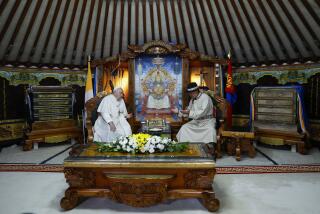Pope Doesn’t Blame Bulgaria
- Share via
SOFIA, Bulgaria — Pope John Paul II, meeting Friday with this nation’s president, bluntly rejected allegations that the former Communist government here was involved in a 1981 assassination attempt on the pontiff’s life.
“The Holy Father at the meeting with the president expressed his view on the topic. He literally said, ‘I never believed in the so-called Bulgarian connection,’” Vatican spokesman Joaquin Navarro-Valls told reporters.
Three Bulgarians faced trial in Italy as alleged co-conspirators in Turkish gunman Mehmet Ali Agca’s attempt to kill the pope in St. Peter’s Square. They were acquitted for lack for evidence, but allegations that Bulgaria’s secret service and the Soviet KGB had played a role were never entirely put to rest.
“His Holiness’ judgment was that it was an insinuation and a great injustice to the Bulgarian people,” President Georgi Parvanov said after the meeting.
John Paul’s statement was treated as a cause for celebration here, on the grounds that it erased a stain on the country’s name.
Afternoon tabloids ran front-page headlines such as “The Pope Announced After 21 Years: I Have Never Believed in the Bulgarian Connection,” and “Pope John Paul II: Sergei, You’re Innocent,” a reference to Sergei Antonov, one of the three Bulgarians acquitted.
The news also was announced to the audience at an evening cultural show attended by the pontiff.
The pope’s words came on a day when he honored the memory of saints Cyril and Methodius, 9th century Scripture translators and inventors of the Cyrillic alphabet. They are considered the patron saints of Bulgaria for their role in converting the nation to Christianity, and Friday was a holiday in their honor.
“The work of Cyril and Methodius made an outstanding contribution to forming the common Christian roots of Europe,” John Paul said in a speech at the cultural event, which featured top performers of symphonic, choral and traditional folk music and dance.
John Paul, 82, met earlier in the day with Patriarch Maxim, head of the Bulgarian Orthodox Church, in an effort to promote closer understanding between the Roman Catholic and Orthodox faiths. At that event he was greeted with a traditional offering of nuts, coffee, water and plum brandy. The pontiff politely declined to taste the brandy but was given a bottle to take back to Rome.
Before the meeting, John Paul visited Sofia’s main Orthodox cathedral, where he was greeted by Bishop Simeon, leader of the Bulgarian Orthodox Church’s activities in Western Europe.
Simeon gave the pontiff an icon of saints Peter and Paul, declaring: “We admire your great deeds. We take you as an apostle.”
After leaving the cathedral, John Paul rode briefly in his bulletproof popemobile to greet well-wishers, who waved flowers and cheered.
In a speech during his visit with Maxim and Orthodox bishops, John Paul expressed the anguish he feels at divisions within Christianity.
“Christ our Lord founded a single church, while we today appear to the world divided, as if Christ himself were divided,” he said. “Such division openly contradicts the will of Christ, scandalizes the world and damages that most holy cause, the preaching of the Gospel to every creature.”
Relations between the Roman Catholic and Orthodox churches “suffered grievous wounds in the course of history,” he added. “Often enough, people of both sides were to blame.... Today we can give thanks to God that the bonds between us have been much strengthened.”
The Roman Catholic and Orthodox churches split in 1054, and over the centuries they have at times been bitter rivals.
There are just 80,000 Catholics in Bulgaria, a nation of 8 million people.
Orthodox faiths have been cool to the pontiff’s overtures in many countries, in some cases fearing that Roman Catholics were trying to win over their traditional believers.
In an apparent attempt to allay such fears without ruling the Catholic Church out of the picture, John Paul’s speech assured Maxim and other Orthodox leaders of his “constant prayer that the Lord will grant the Orthodox Church of Bulgaria to accomplish with courage, together with the Catholic Church, the mission of evangelization which he has entrusted to your church in this land.”
As a gift to the Orthodox Church, John Paul turned over to Maxim a wooden box containing what is believed to be an arm bone of St. Dasius, which the pontiff described as “a famous relic.” The pontiff noted that the 1,700th anniversary of his martyrdom is approaching. John Paul also met Friday with representatives of Bulgaria’s 3,500-member Jewish community.
Throughout his trip, which took him first to the former Soviet republic of Azerbaijan, John Paul--who is frail and suffering from symptoms of Parkinson’s disease--has read parts of his speeches himself and had aides read out the rest.
Mimi Dineva, 43, a nurse, said: “I was proud. In spite of his physical state, he looked happy, which means we were able to arouse those feelings.”
More to Read
Sign up for Essential California
The most important California stories and recommendations in your inbox every morning.
You may occasionally receive promotional content from the Los Angeles Times.













